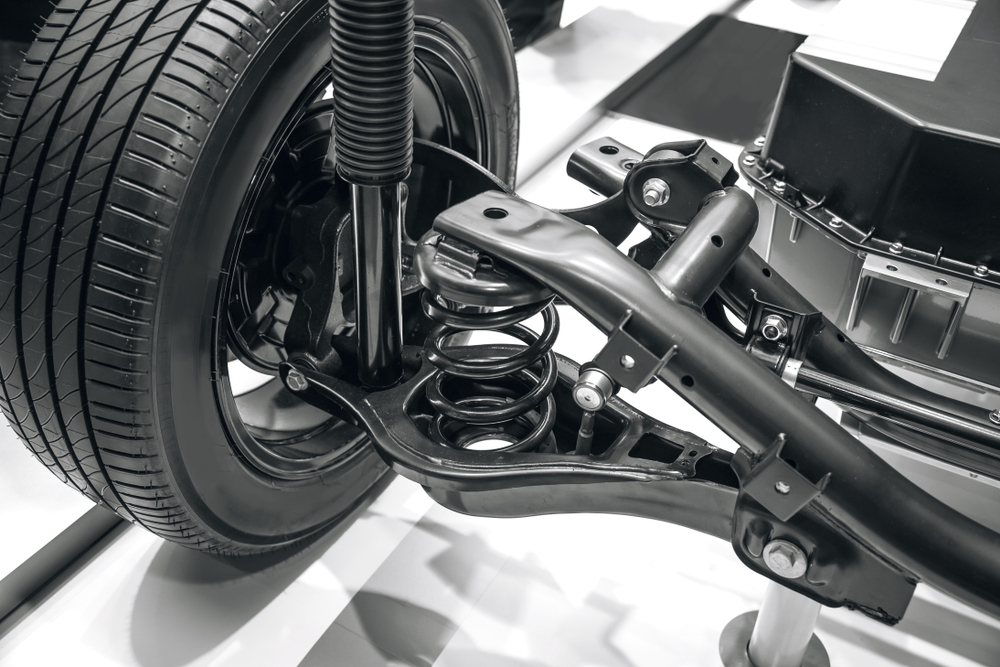Have you ever wondered what exactly a suspension system is? In simple terms, it's the unsung hero that makes your car journeys smooth and comfortable. It's a collection of parts that connect your car's wheels to the main body (chassis), allowing the car to glide over bumps and potholes without shaking you like a snow globe.
But that's not all! The suspension system also plays a crucial role in keeping your wheels firmly on the ground, ensuring you have proper control over your vehicle. It works hand-in-hand with your brakes and steering to maintain stability, making it a vital part of your car's overall safety.
Now, let's break down the key components of a typical suspension system and discuss the importance of regular maintenance, as well as common issues that can arise if a component breaks or wears out:
Springs: These flexible, coiled metal parts absorb the impact from bumps and potholes by compressing and expanding. There are different types of springs, such as coil springs, leaf springs, and torsion bars, each with its own unique design and application. If a spring breaks or weakens, your car may sag, bottom out more easily, or bounce excessively. Additionally, a broken spring can make a loud clunking noise when going over bumps.
Shock absorbers (or dampers): As the name suggests, these guys are here to absorb and dissipate energy, preventing excessive bouncing after hitting a bump. They work by converting kinetic energy (movement) into thermal energy (heat), which is then dissipated into the air. Worn-out shock absorbers can cause excessive bouncing, poor handling, and uneven tire wear. You might also hear a knocking sound when going over bumps if your shocks are worn.
Struts: A strut is essentially a shock absorber and coil spring combined into a single unit. Struts provide structural support to the vehicle and play a role in handling and ride comfort. Worn struts can cause similar issues as worn shocks and springs, as well as clunking or rattling noises during turns.
Control arms (or wishbones): These are the bones of your suspension system, connecting the wheels to the vehicle's frame. They help maintain proper wheel alignment and pivot as the wheels move up and down. Worn control arm bushings can cause steering vibrations and wandering, while a bent or damaged control arm may result in poor handling and alignment issues.
Ball joints: Acting like the shoulder joints in our body, ball joints allow the control arms and steering knuckles to move smoothly, enabling your wheels to steer and navigate those twisty roads. Worn ball joints can cause clunking noises, vibrations, and uneven tire wear, as well as unpredictable steering.
Bushings: Made of rubber or polyurethane, these small but mighty components cushion and reduce friction between various parts of the suspension system, ensuring a smooth, quiet ride. Worn bushings can lead to rattling or clunking noises, as well as reduced handling performance.
Sway bars (or anti-roll bars): Sway bars help maintain stability by reducing body roll (the tilting of the car) during sharp turns. They connect the left and right wheels, distributing the weight more evenly and keeping your car balanced. Worn or broken sway bar links can cause poor handling and clunking noises, particularly when cornering.
Whew! That was a lot of information, but now you know the basics of a vehicle's suspension system. Regular suspension maintenance and inspections are crucial for keeping your vehicle running smoothly and safely. By addressing any issues early on, you can avoid more costly repairs and potentially dangerous situations on the road. Make sure to consult your vehicle's owner's manual for recommended service intervals and visit Kunes Hyundai of Quincy Service Center, if you notice any of the symptoms mentioned above.




